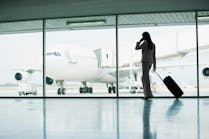84% of Travelers Want Bio-Security Measures to Protect Against Current and Future Pandemics
Ever stop to think how many hands touch your luggage from the time you leave home, arrive at the airport, and then reach your travel destination? Curious to know how many virus particles fit on a single pinhead? Are you in the habit of disinfecting your luggage after a trip?
According to a Post-COVID-19 Air Travel/Bio-Security survey conducted last week, all respondents said they believe their baggage has passed through a lot of hands – 10 or more. Of those, 17 percent believe more than 20 hands have handled their luggage, whether while using a ride service, the baggage handlers at the airport, or hotel personnel. It's no wonder, then, that when COVID-19 hit, consumers were reluctant to travel.
More than 55 percent of the consumers who completed the survey, in fact, said they did not travel by air last year because they feared either contracting the virus or potentially spreading it to others. This, and the actions taken by the airline industry as a result of COVID-19, created a huge blow to air travel. According to the International Air Transport Association (IATA), the pandemic resulted in a 66 percent drop in air travel last year. That’s more than after the September 11, 2001 terrorist attacks, the Severe Acute Respiratory Syndrome (SARS) outbreak of 2003, and the global financial crisis of 2008.
As people around the globe are being vaccinated against the Coronavirus and with more awareness about the devastating effects of virus spread, it’s not surprising that more than 84 percent of respondents said they agree with officials at the world’s leading agencies – the Centers for Disease Control (CDC), World Health Organization (WHO), and the Council of European Unions – that another pandemic is inevitable, and it is critical to be prepared.
As with x-ray and other measures taken at airports following the 9/11 terrorist attacks, those same respondents agree airports should take bio-security measures to minimize the health and economic impact of future virus spread. Specifically, when asked if they’d feel safer and more likely to travel by air if luggage would be completely and quickly disinfected using ultraviolet (UV) technology at the airport, 78 percent said yes.
For some respondents, the COVID-19 crisis is waning because many have received vaccinations against Coronavirus. Still, only 16 percent said they felt additional bio-security measures are unnecessary.
“The COVID-19 virus has inflicted devastating health and economic impact on the world, but the call for bio-security at airports is a practical solution that can lessen or even stop the rapid spread of future contagions,” said Amir Fischer, CEO of WarpUV. “Studies show the most effective way to disinfect items like checked luggage and carry-on bags – many of which are soft-sided or have many handles, zippers and uneven surfaces – is with 360-degree ultraviolet (UV) light bio cleansing. The technology exists, it’s proven fast and effective, and is ready to be implemented.”
Some additional data from the WarpUV/SurveyMonkey consumer survey include:
When asked whether they realized that 100 million virus particles of COVID-19 could fit on the head of a pin, 62 percent said they had not previously heard that fact.
58 percent of respondents said they have never disinfected their own luggage during or after use. Of those, 28 percent said, in light of the virus spread, they will now start doing so.
During the height of the pandemic, the ability to travel by air around the world was heavily curtailed due to flight cancellations, as well as airport closures because baggage handlers or passengers had contracted COVID-19. Just last week, Changi Airport in Singapore closed due to a report of COVID-19 cases. Although cases of COVID-19 contracted at airports were widely reported, 55 percent of respondents queried in the survey were unaware of this fact.




